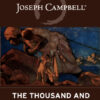
Asian Journals — India and Japan
By Joseph Campbell | Edited by David Kudler, Robin Larsen, Stephen Larsen, and Anthony Van Couvering
This title is part of the The Collected Works of Joseph Campbell series
At the beginning of his career, Joseph Campbell developed a lasting fascination with the cultures of the Far East, and explorations of Buddhist and Hindu philosophy later became recurring motifs in his vast body of work. However, Campbell had to wait until he was 50 to visit the lands that inspired him so deeply. In 1954, he took a sabbatical from his teaching position and embarked on a yearlong voyage through India, Thailand, Cambodia, Burma, Hong Kong, Taiwan, and finally Japan. He encounters an Asia that shocks and transforms him.
Asian Journals combines the two hardcover editions of Campbell’s journals, Baksheesh & Brahman and Sake & Satori, into one paperback volume, an edited day-to-day travel diary of the people he met and the historical places he visited on his trek through Asia. Along the way, he enlivens the narrative with his musings on culture, religion, myth, and politics, describing both the trivial and the sublime. This volume includes over a hundred of Campbell’s own photographs and sketches, as well as maps and copious notes to give context to Campbell’s thoughts and observations. As always, Campbell’s keen intellect and boundless curiosity shine through in his lucid prose. From these pages, Campbell enthusiasts will come away with a deeper understanding of the man, his work, and his enduring legacy.
Another name for this doctrine is the Doctrine of the Net of Gems, in which the world is regarded as a net of gems, each gem reflecting perfectly all the others. It is also called the Doctrine of Mutual Arising, and represents a notion of universal karma, not individually separated karmas. This is the meaning of the term the flower wreath –– Kegon. Everything causes everything else. [share]
Since divinity is the essence of every being, we must not let our moral judgments obscure from us the fact that God is shining through all things, even those of which we cannot approve [share]
Art carries us beyond speech to experience. [share]
You are a wave on the ocean. When the wave is gone, is the water gone? [share]
The eternal principle, which never was born, never will die: it is in all things: it is in you now. You are a wave on the face of the ocean. When the wave is gone, is the water gone? Has anything happened? Nothing has happened. It is a play, a game, a dance [share]
In Japan all things are Buddha things. All things are themselves the real. The fluid aspect of impermanence is itself the absolute state. [share]
Filter:
Sort:


















